Assange, WikiLeaks and how Israel enslaved the British
How Donald Trump’s best friend in Britain – another big fan of Vladimir Putin – put his party at the service at WikiLeaks’ Julian Assange
Oh, what a tangled web we weave, when first we practice to deceive…
While few would dispute that a tangled web surrounds his public image, many fail to discern that Assange is practicing deception: in fact, it is his raison d’être, he and his WikiLeaks organization are a front for what the CIA correctly identified as a “hostile intelligence service”: we will go further and identify them as Israel’s Mossad.
Furthermore, the unstinting support given to Assange and WikiLeaks by Nigel Farage and his UK Independence Party (UKIP) is a clear indicator that they too are serving Israeli masters and have been ever since they appeared on the British political scene in the 1990s.
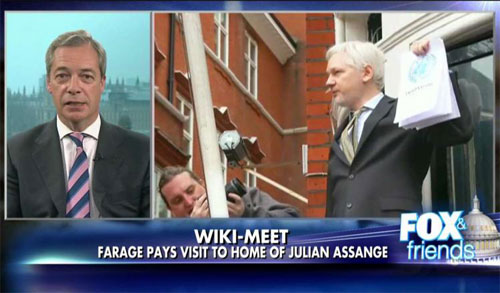
Let us step back in time to the mid-90s, a time when Britain was coming to the end of a 15 year rule by the Conservative Party, most of it under Margaret Thatcher. The Labour Party was undergoing a resurgence due to the leadership of John Smith and the disarray within the Conservative Party caused by the thorny issue of the EU and the Maastricht Treaty.
Labour Party leader Neil Kinnock had failed to win the 1992 election, largely due to poor handling of the media and a failure to sell Kinnock to the British people – he was too Welsh and too ginger and Labour never managed to market him effectively, the popular support within the electorate was there but the marketing savvy was lacking.
The Conservatives under Thatcher in the 1980s had transformed British politics by hiring the prestigious Saatchi & Saatchi PR firm and making politics more about the image presented to the public than actual policies. Kinnock’s failure in 92 began a new phase in the history of the Labour Party as party insiders realized that, to beat the Conservatives they had to play the same game where PR spin was king and policies a distant second in importance.
John Smith replaced Kinnock and was hugely popular both with his own party and the British electorate, he was seen as a near certainty to win the 1997 election – sadly he died of a heart attack in 1994 and was replaced by the man who today is best remembered as the war criminal that followed George W. Bush into wars in Afghanistan and Iraq like a faithful lap dog, one Tony Blair.
Tony Blair was an Israeli asset from the moment he first entered politics under the sponsorship of Zionist Jew Levy Mendelsohn, a man Blair would make Lord Levy shortly after becoming Prime Minister, in partnership with Peter Mandleson, a close friend of the Rothschilds. Blair destroyed the Labour Party, turning it into New Labour and moving it from a left wing, socialist party to a center-right, populist puppet that emulated the PR spin tactics of the 1980s Conservatives while slavishly following the directions of their Israeli masters.
All the other New Labour leaders were stooges too. Jack Straw, Gordon Brown, all of them, only John Prescott remained from the old socialist Labour and he likely only got to remain because he knew where the bodies were buried, so to speak.
Under Blair and New Labour, Britain entered a new and shameful period where UK functioned as the 51st state of the USA and its armed forces became an adjunct of those of the US, dutifully working alongside the Yanks to fight the War on Terror in Afghanistan and Iraq and share in the heroin, oil and stolen resources profits.
During the Blair years, the Conservative party fell into utter disarray under a series of unpopular and ineffective leaders such as William Hague and Iain Duncan Smith (yes, no-one remembers them in Britain either), torn apart by a deep divide over the issue of Britain’s membership of the EU. Out of this divide came Nigel Farage and UK Independence Party.
Farage, a former City of London banker, formed UKIP in order to attract away from the Conservative Party those who were referred to as “Euro Skeptics” and wanted Britain to either leave the EU entirely or at least change drastically the nature of Britain’s membership of the EU. With the benefit of hindsight, it is now clear that Farage and UKIP was an Israeli operation to weaken and destabilize the Conservative party, thus allowing Tony Blair and New Labour to enjoy almost 15 years in power. Thus, Britain became an Israeli puppet.
While UKIP never became a major force in British parliamentary politics, they served a vital role in the Israeli takeover.
By 2010 and the election of David Cameron, Israeli control had been completely solidified: Cameron had been an Israeli asset since at least the early ’90s and he continued to follow Tel-Aviv’s orders every bit as obediently as Blair had before him.
Fast forward to 2016 and the infamous referendum on membership of the EU, now universally referred to as Brexit. Cameron dutifully did as he was ordered and lost. Farage won a clear case of Israeli controlling both sides and ensuring they get the result they desired – Britain out of Europe, thus destabilizing both the EU and Britain itself.
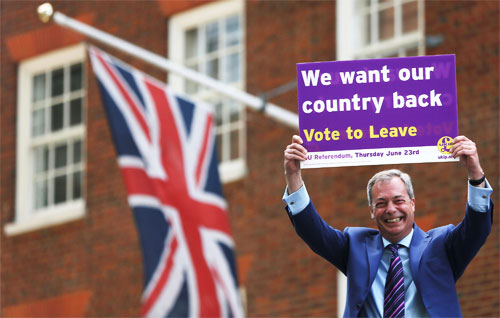
Having served their roles and achieved their assigned tasks, Farage and Cameron both retired from politics post-Brexit. Cameron to enjoy his vast personal wealth. Farage to float around the fringes of politics, occasionally sticking his head up to support his fellow Israeli stooges – best evidenced by his visit to the US during the last election in order to make a few speeches praising his good pal Donald Trump.
So now you have the background to where Britain is today, a nation where the ruling Conservative Party is every bit as much under Israeli-control as New Labour had been under Blair, meaning the British people have been under the Zionist thumb for the last 20 years.
A glimmer of hope does exist in the form of Labour Party leader Jeremy Corbyn, a true socialist of the old Labour party, who has been attacked and slandered at almost every turn as an anti-Semite and labelled as “unelectable” by the British media, despite enjoying massive popular support amongst the British people. Of course, Corbyn is no anti-Semite. He is simply labelled that because he is not an Israeli asset, the first leader of either the Labour or Conservative parties for over two decades who is not a puppet of Tel-Aviv.
Corbyn has attempted to purge the Labour Party of its Blairites, those who have taken the dirty shekel preferred by the Zionist criminals. That task remains incomplete, hence we have witnessed many attacks on Corbyn from within his own party. Sadly, if he loses the upcoming general election, Corbyn will probably not get the chance to complete the purge of the Blairites as a challenge to his leadership of the party will almost certainly arise. [Update: in the June 8th 2017 general elections in UK – for the seats in the House of Commons – the Conservative Party (which had governed as a senior coalition partner from 2010 and as a majority government from 2015), led by Theresa May, won its highest vote share since 1983 – 330 seats (36.8%). The Labour Party, the official opposition led by Jeremy Corbyn, achieved its greatest share of the vote since 2001 – 232 seats (30.4%). May hoped to secure a larger majority for the Conservative Party in order to “strengthen her hand in the forthcoming Brexit negotiations”.]
In recent weeks, Tony Blair himself has mooted a potential return to politics, this is a clear indicator that the Zionists are concerned that Corbyn has had at least a measure of success in his campaign to rebuild the Labour Party into it’s original, socialist form and remove the Israeli hegemony it has been enslaved under: hence they are threatening to reintroduce their faithful servant Blair and use him to undermine Corbyn while dividing the Labour party in much the same way they used their boy Farage to deeply wound the Conservatives in the 1990s.
When Assange stepped onto the balcony of the Ecuadorean Embassy in May (2017) and gave his “can’t forgive or forget” speech and stating that “the war is far from over” he was reading directly from the agenda set for him by Tel-Aviv. The Swedish rape charges that have just been dropped were a complete fabrication, part of a psyop designed to lend credibility to Assange, to paint him as a real deal fugitive from justice who was the sworn enemy of the powers that be.
Of course, this is a total inversion of the truth. Assange and WikiLeaks along with the British government, the British media and the British Establishment are all on Tel-Aviv’s payroll, all faithful servants, willing conspirators and faithful partners in crime to that evil Zionist regime. Farage too, although now relegated to the sidelines, remains ready, waiting and more than willing to continue to serve those same masters.
WikiLeaks: Inside the Farage-Assange-Trump Connection
When Julian Assange sought refuge in 2011 at an embassy in the heart of London, only one of Britain’s political parties was willing to offer support to the exile in their midst. Nigel Farage’s U.K. Independence Party, which seemed a fringe movement at the time, but became the driving force behind Brexit, swung into action and campaigned against the demand that Assange be returned to Sweden for a police interview on allegations of rape.
Farage and his UKIP colleagues have spoken out publicly in support of Assange numerous times since 2011, but leaked emails seen by The Daily Beast reveal the true extent to which the party apparatus tried to assist the founder of WikiLeaks, which the head of the CIA has since described as a “hostile intelligence service” that cooperated with Russian agents.
The episode raises further questions about links between Farage, Assange and the Russian government. Farage, who is also a favored friend of U.S. President Donald Trump, was spotted emerging from a meeting with Assange at the Ecuadorian embassy in March (2017).
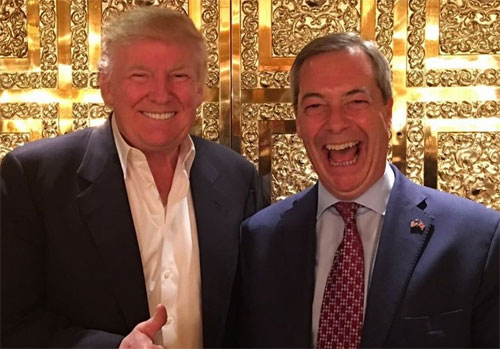
Internal UKIP memos reveal the relationship went back much further: Assange and his lawyer were given the opportunity to contribute directly to speeches given by UKIP on the floor of the European Parliament while branches of the party in and around London were told to send activists to protest against Assange’s proposed judicial surrender to the authorities.
“We need bodies”, read an email request sent to local UKIP associations asking them to send two or three people each as an ‘AstroTurf’ protest against Assange’s plight when he appeared in court in London in January 2011.
Farage and his UKIP colleagues also reportedly met privately with Assange’s lawyer Mark Stephens, who was repeatedly offered the chance to help craft the party’s words on the case, according to the leaked emails. Stephens was asked if he or Assange would like to meet a UKIP member of the European Parliament, Gerrard Batten, on January 31 that year “in order to discuss bringing out issues in the case”.
He was asked again if he wished “to include a few points to get the message across” on February 5, 2011, before Batten was due to speak in the European Parliament. Batten asked Stephens again if he had “any points that you feel I should or should not mention in the few minutes I get to speak” on February 11.
Batten addressed the European Parliament, standing at Farage’s right hand, on February 14, 2011 where he raised the prospect that Assange was being mistreated because he was “a political dissident”. He returned to the case in June 2011, telling the parliament in Brussels that the U.S. “need him locked up somewhere” while they work out how to prosecute him.
The UKIP Member of the European Parliament also made a submission on behalf of Assange in his case against extradition, which went all the way to Britain’s Supreme Court in 2012. Last year (2016) Batten wrote on his blog that Assange’s stay in the embassy of Ecuador had been tantamount to “arbitrary arrest and imprisonment”.
When news broke in May 2017 that Sweden would no longer pursue the allegations against Assange after a seven-year standoff while he hid in an embassy out of the reach of British law enforcement, Batten told The Daily Beast he had never taken a position on the guilt or innocence of Assange.
“I don’t really have a view about Mr. Assange. My involvement with him was regarding my opposition to the European Arrest Warrant” he said. “At the time, eminent British lawyers who looked at it said this would never make it to an English court – these kind of accusations. It didn’t sound very sound in the first place”.
Assange hailed Sweden’s decision to stop pursuing the allegations and celebrated the release of Chelsea Manning – one of the first major WikiLeaks leakers – in a speech from the balcony of the embassy in London’s Mayfair.
“We have today won an important victory, but the road is far from over. The proper war is just commencing” he said, promising to accelerate the distribution of material about the CIA. The standoff will continue because there is still an outstanding warrant for Assange’s arrest over skipping bail.
Batten told he had attended Assange’s lavish 40th birthday party in 2010 but had not met with him since. He said he does not recall whether Stephens or Assange took up his offer to help with his speeches. He also said he had received no donations from anyone connected to WikiLeaks or the Russian government. “If only these people would offer me money. I’d have the luxury of refusing it” he said.
UKIP has repeatedly denied co-operating with Russia. Russian front organizations, or taking funds from the Kremlin – which would be illegal under British law – but Farage, who was one of the first foreign politicians to meet with Trump after his election, has called for improved relations between Russia, Britain, and the U.S. He also described Vladimir Putin as the foreign leader he most admires.
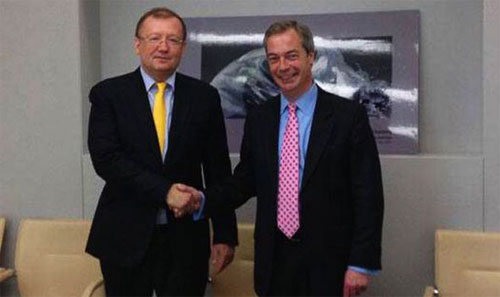
In May 2017, Farage refused once again to answer questions about his recent visit to see Assange in the Ecuadorian embassy in London. “That has nothing to do with you,” he snapped at a Die Zeit reporter. “It was a private meeting.”
He has claimed that he met Assange as a journalist – not as a political go-between – but no interview has appeared since the March 9 meeting.
In the same interview, Farage also failed to disclose whether he received payments for his regular appearances on RT, a news channel funded by the Russian government, which paid Assange to produce his own show in 2012.
The secrecy surrounding Farage’s meeting with Assange prompted speculation that he may have been sent as an emissary from someone in Trump’s orbit. Farage is close to Trump, he has also met the political operative Roger Stone who claimed to have a back-channel to Assange last summer.
Farage has denied that he was carrying a secret message to or from Assange, whose WikiLeaks organization has been accused of influencing the result of last year’s U.S. presidential election with the help of Russian hackers.
One of the UKIP candidates contesting Britain’s election in June told that there is nothing suspicious about the attitude towards Russia taken by Farage and his party. Nigel Sussman, the parliamentary candidate for Edmonton in North London, says it’s a natural meeting of minds.
“Russia is very credible and commonsensical – and UKIP is very credible and commonsensical” he said. “There’s a synergy of views there.”
Sussman has a more intimate view of Russia than most British politicians. He traveled to Crimea as a guest of the Russian parliament, who paid for internal flights, accommodation and food. Sussman says he paid for his own round-trip flights to Russia.
Sussman, the chair of UKIP’s Ilford association, who was on the trip with another former UKIP candidate, met with the local pro-Russian officials and toured the streets of former eastern Ukraine talking to local residents accompanied by cameras from Russia’s state-owned TV Channel 1. Although most of the international community regards Moscow’s covert occupation and annexation of Crimea following as stage-managed vote as illegal and illegitimate, based on his interviews, Sussman says: “Crimea had a perfectly legitimate referendum in my opinion.”
As a result, he has submitted a report to UKIP’s National Executive Committee, which calls for a policy change – demanding that sanctions should be lifted against Russia.
“As far as I can see there don’t seem to be a lot of people standing up for Russia right now” he said. Is UKIP the most pro-Russian party? “Yes. I think it is.”
Sussman is, however, hopeful that Trump will ease relations between Moscow and the West. “I have high hopes for Trump because Trump is going to meet Putin. I think he has said it plain: he wants to be friends with Russia. That sounds like an eminently sensible position for God’s sake!”
The UKIP candidate insisted that there was no evidence that Putin’s regime had helped Trump into office, although the U.S. intelligence community is on the record and unanimous in its conviction that Russia tried to influence the outcome. He also explained away Moscow’s reported munificence towards Marine Le Pen. “What happened was Le Pen tried to get a loan from French banks and none of the French banks would lend her any money – and that’s outrageous… It’s a bit like UKIP. I mean God help us!”
The bottom line: Le Pen’s party received millions of dollars in loans in 2014 from a now defunct Russian bank, and whether coincidentally or out of conviction, her minions, too, endorsed the Crimean annexation.
The two representatives from Britain on the Crimea tour this year were not joined by any members of Le Pen’s National Front, but the guests included an unlikely array of minor party politicians like Jaroslav Holik from a Czech party with links to Le Pen or the son of Serbia’s Vojislav Seselj, who was acquitted of war crimes and crimes against humanity by a United Nations tribunal in the Hague.
“It’s a collection of odds and sods: far left or far right will do, as long as they are open to some Russian support. Some of these are full Russian puppets like the Serbian Radical Party”, said Neil Barnett, the chief executive of Istok Associates, a corporate intelligence and investigations consultancy.
There is evidence that Russia helped UKIP secure Brexit – using its army of online trolls and bots – but there is no proof of collusion or direct funding from the Kremlin, or assistance from WikiLeaks.
Arron Banks, the British businessman who was once UKIP’s biggest donor and set up the unofficial Brexit campaign group Leave.EU says he has a good relationship with Russia – including long boozy lunches with the Russian ambassador – but says there has been no monetary donation either directly or through his array of offshore companies.
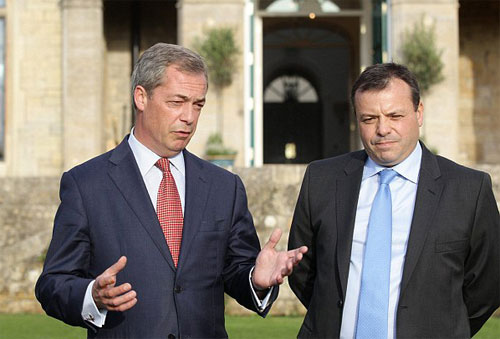
Banks, who was pictured in the entourage that met Trump with Farage in the days just after Trump won the election, gave an extraordinary interview to the Observer newspaper in London in April 2017 in which he admitted that his Russian wife had the profile of a Russian spy, then suddenly denied that Russia had bankrolled Brexit – unprompted – and repeatedly defended Putin.
“What you’re talking about is the degree to which the Russians actually – let’s say they influenced the Brexit vote. Say I’m pro-Putin. Nigel said he’s not anti-Putin, if that’s the right word. But all we’ve said is that there are elements of what Russians do that we don’t disagree with. We don’t agree with everything they’re doing, like murdering journalists in the street” he said.
This “joke” is typical of Banks, who ensures it’s hard to know exactly how seriously his words should be taken at any given moment.
When his old pal Farage was spotted leaving the Ecuadorian embassy in March, original reports said it was unclear why he had been inside the building – not least since Farage claimed to have forgotten.
A newspaper later reported that he had indeed been holding secret talks with Assange and Banks wrote on Twitter: “Well he didn’t go for drinks with the ambassador did he?”
Another multi-millionaire with loose-lips like Trump, Banks seems to revel in offering glimmers of a sprawling axis that runs from Washington D.C. to Moscow via London – and a tiny sliver of Ecuadorian sovereignty.
Whether Assange makes it outside the embassy or if he continues to hide from justice – the game of shadows will continue.
yogaesoteric
July 1, 2017
